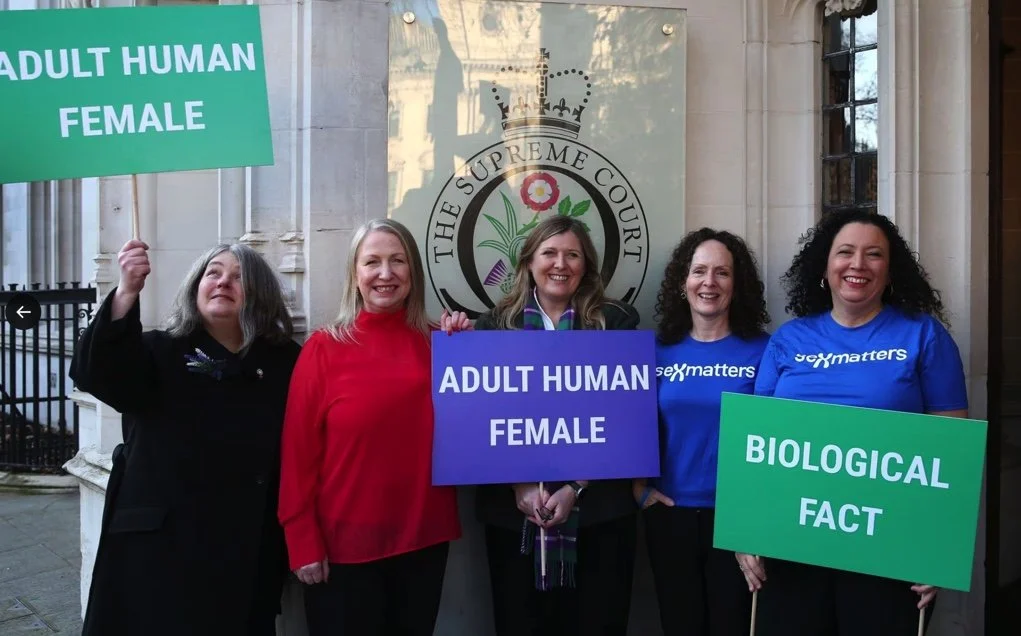A Conflict Of Rights
Last week saw Scottish campaigners, For Women Scotland go head to head with The Scottish Government at the UK Supreme Court.
Image Credit Frankie Fajardo
Last Tuesday saw the beginning of the campaign group, For Women Scotland's final appeal against the Scottish government in a case that will have far-reaching ramifications for society.
For Women Scotland V The Scottish Ministers took place over two days, with both Sex Matters and the Equality and Human Rights Commission acting as interveners respectively.
The case deals with what some have described as a conflict in rights between females and people who with a Gender Recognition Certificate (GRC) have the acquired legal sex of female. A conflict in the meaning of “sex” vs the meaning of “gender” has led to gaps in legislation and consequently to cases like this whereby using the law, campaigners seek clarification.
Throughout proceedings there were moments of note, mainly when counsel was called to answer definitions that are contested. One such instance was what category a female with a GRC (and therefore legal sex of male) would fall into if discriminated against for being pregnant.
Heather Binning is the director of Women’s Rights Network (WRN) an organisation that connects women termed as “gender critical”. She was in attendance last week and said of the hearing.
“For so many of us, the answer is obvious, sex cannot change, therefore the protected characteristic of sex cannot be changed. It is when the opposing argument is put forward that it becomes difficult. This led to some marvellous moments in court where the Scottish Ministers representative attempted to explain what “living as a woman” meant, the ridiculous attempt to draw an analogy with the “legal fiction” and adoption and the even more ridiculous concept of “when a man is a lesbian”.
From the beginnings of trying to ensure representation of women on public boards, the Scottish government has done us all a favour by allowing these arguments to be expressed in a very public way.
First, we had Maya [Forstater], then the Cass Report. The Supreme Court could be the Grand slam.”
Image credit Frankie Fajardo
A previous court judgment by Lady Haldane found that legal sex was not limited to birth sex and that a person in possession of a GRC was entitled to the same provisions as those born biologically female. This is particularly relevant to the Equality Act of 2010 which sets aside nine protected characteristics upon which reasonable adjustments and special considerations must be considered.
Maya Forstater is the founder of Sex Matters, an organisation that advises and campaigns on the importance of sex in law and of the freedom to assert that sex is consequential, particularly to women. Ms. Forstater previously won a case against her former employer, The Centre for Global development after a tribunal found that her contract had not been renewed because of her gender critical views, views which were later found to be “worthy of respect in a democratic society” and consequently protected beliefs under the EA 2010.
Of the case she had this to say,
“The judges asked many questions that should have been asked long before; erasing the category of sex and replacing it with a legal fiction runs headfirst into conflict with reality, women’s rights, dignity and privacy, women’s bodies, maternity and sexual orientation.”
What began as a query about the Gender Representation on Public Boards (Scotland) Act 2018, which was, as the name suggests, about getting more women onto boards has become a question that has divided an already divided nation and become one of the most contentious issues of the decade.
The potential implications of the uncertainty of the law as it stands are why, For Women Scotland say, they have taken the case to the Supreme Court.
A spokeswoman from For Women Scotland said of the hearing,
“Whatever happens now we are really grateful that these arguments were explored in the highest court in the land. It was very clear that allowing some people to change their sex in law creates huge issues for the operation of the EA and the integrity of protected groups. We desperately need more clarity in law, and we hope this case will be instrumental in achieving this.”
Image credit For Women Scotland
The judgement, which is not due to be made until next year will likely come under the scrutiny of all who hear it, as recent cases involving both women’s rights and gender identity have become fertile ground for culture wars and controversy.
Ongoing conversations within Westminster around puberty blockers for minors and the conversion therapy bill have led to many trans organisations expressing fear that those they represent would be seriously negatively impacted by any change in law. However, women’s rights groups have said that contrary to fighting for their own category’s rights, trans rights organisations are seeking to identify into a category that is not designed for them and in doing so weakening the protections of those the category was intended to serve. This, they say disproportionately comes at the cost of women.
While the outcome will not be known for some months the campaigners say a ruling against them would force the decision back to parliament and therefore the legislature, this, they believe, would spur on a change in law. The EHRC also desires a clarification of the Equality Act, however both parties have a very different view of what his would look like, with both perceiving the others desired outcome as infringing upon rights.
However, whether parliament will intervene remains to be seen.



